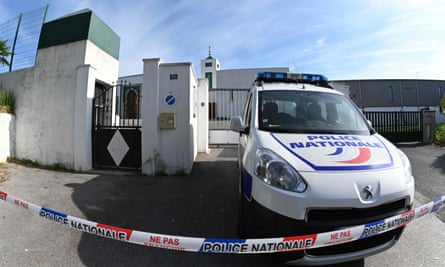Bayonne mosque attack was terrorism, says survivors’ lawyer
A lawyer for two men who were injured in an attack on a mosque in south-west France this week has said the case should be treated as terrorism. Méhana Mouhou, who represents two men aged 74 and 78 who were shot when they disturbed the suspect trying to set fire to the mosque in Bayonne, […]

A lawyer for two men who were injured in an attack on a mosque in south-west France this week has said the case should be treated as terrorism.
Méhana Mouhou, who represents two men aged 74 and 78 who were shot when they disturbed the suspect trying to set fire to the mosque in Bayonne, said: “This was a terrorist act.”
Claude Sinke, 84, a former far-right supporter, has been charged with attempted murder, arson and gun violence but not terrorism offences.
Mouhou said the charges were a “masquerade” and a result of “judiciary ineptitude”, and he has sought a meeting with the state prosecutor to push for the case to be reclassified.
He said: “There were preparatory acts in which he observed the mosque. His motives were clear. Everyone in his entourage says he was Islamophobic and racist. There was a gas canister, arms and targeting. So he was perfectly aware of what he was doing.”
Sinke, who once stood as a local election candidate for Marine Le Pen’s far-right party Front National (now renamed National Rally), was arrested at his home shortly after the attack on Monday.
He was accused of shooting the two men – one in the neck and the other in the chest – and setting fire to a car near the mosque before he fled in his own car. Police said he had admitted the crimes.
Investigators said Sinke wanted to set fire to the mosque to avenge the fire that tore through the roof of Notre-Dame Cathedral in Paris in April, which he blamed on Muslims. Paris police are treating the Notre-Dame fire as accidental and there has been no suggestion of arson or any connection to Muslims.
Sinke was put through two days of psychological tests to determine whether he understood what he had done. The state prosecutor in Bayonne had suggested there were questions about Sinke’s mental health, but it was decided he could be held criminally responsible. He has been detainedand if convicted he could face life imprisonment.
